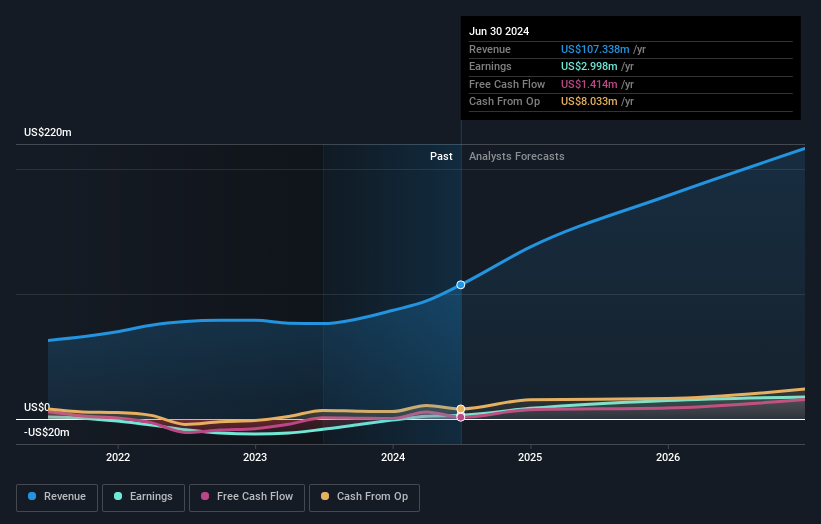Innodata Inc.'s (NASDAQ:INOD) market cap touched US$480m last week, benefiting both individual investors who own 53% as well as institutions
Key Insights
- Innodata's significant individual investors ownership suggests that the key decisions are influenced by shareholders from the larger public
- The top 25 shareholders own 44% of the company
- Institutional ownership in Innodata is 40%
To get a sense of who is truly in control of Innodata Inc. (NASDAQ:INOD), it is important to understand the ownership structure of the business. And the group that holds the biggest piece of the pie are individual investors with 53% ownership. Put another way, the group faces the maximum upside potential (or downside risk).
Following a 11% increase in the stock price last week, individual investors profited the most, but institutions who own 40% stock also stood to gain from the increase.
Let's take a closer look to see what the different types of shareholders can tell us about Innodata.
See our latest analysis for Innodata

What Does The Institutional Ownership Tell Us About Innodata?
Institutional investors commonly compare their own returns to the returns of a commonly followed index. So they generally do consider buying larger companies that are included in the relevant benchmark index.
As you can see, institutional investors have a fair amount of stake in Innodata. This implies the analysts working for those institutions have looked at the stock and they like it. But just like anyone else, they could be wrong. If multiple institutions change their view on a stock at the same time, you could see the share price drop fast. It's therefore worth looking at Innodata's earnings history below. Of course, the future is what really matters.

Innodata is not owned by hedge funds. Our data shows that BlackRock, Inc. is the largest shareholder with 6.5% of shares outstanding. Meanwhile, the second and third largest shareholders, hold 5.4% and 5.1%, of the shares outstanding, respectively. Additionally, the company's CEO Jack Abuhoff directly holds 4.1% of the total shares outstanding.
Our studies suggest that the top 25 shareholders collectively control less than half of the company's shares, meaning that the company's shares are widely disseminated and there is no dominant shareholder.
While studying institutional ownership for a company can add value to your research, it is also a good practice to research analyst recommendations to get a deeper understand of a stock's expected performance. Quite a few analysts cover the stock, so you could look into forecast growth quite easily.
Insider Ownership Of Innodata
While the precise definition of an insider can be subjective, almost everyone considers board members to be insiders. Management ultimately answers to the board. However, it is not uncommon for managers to be executive board members, especially if they are a founder or the CEO.
Insider ownership is positive when it signals leadership are thinking like the true owners of the company. However, high insider ownership can also give immense power to a small group within the company. This can be negative in some circumstances.
We can see that insiders own shares in Innodata Inc.. In their own names, insiders own US$33m worth of stock in the US$480m company. It is good to see some investment by insiders, but it might be worth checking if those insiders have been buying.
General Public Ownership
The general public, mostly comprising of individual investors, collectively holds 53% of Innodata shares. With this amount of ownership, retail investors can collectively play a role in decisions that affect shareholder returns, such as dividend policies and the appointment of directors. They can also exercise the power to vote on acquisitions or mergers that may not improve profitability.
Next Steps:
I find it very interesting to look at who exactly owns a company. But to truly gain insight, we need to consider other information, too. For instance, we've identified 2 warning signs for Innodata that you should be aware of.
Ultimately the future is most important. You can access this free report on analyst forecasts for the company.
NB: Figures in this article are calculated using data from the last twelve months, which refer to the 12-month period ending on the last date of the month the financial statement is dated. This may not be consistent with full year annual report figures.
Have feedback on this article? Concerned about the content? Get in touch with us directly. Alternatively, email editorial-team (at) simplywallst.com.
This article by Simply Wall St is general in nature. We provide commentary based on historical data and analyst forecasts only using an unbiased methodology and our articles are not intended to be financial advice. It does not constitute a recommendation to buy or sell any stock, and does not take account of your objectives, or your financial situation. We aim to bring you long-term focused analysis driven by fundamental data. Note that our analysis may not factor in the latest price-sensitive company announcements or qualitative material. Simply Wall St has no position in any stocks mentioned.
 Index Options
Index Options CME Group
CME Group Nasdaq
Nasdaq Cboe
Cboe TradingView
TradingView Wall Street Journal
Wall Street Journal